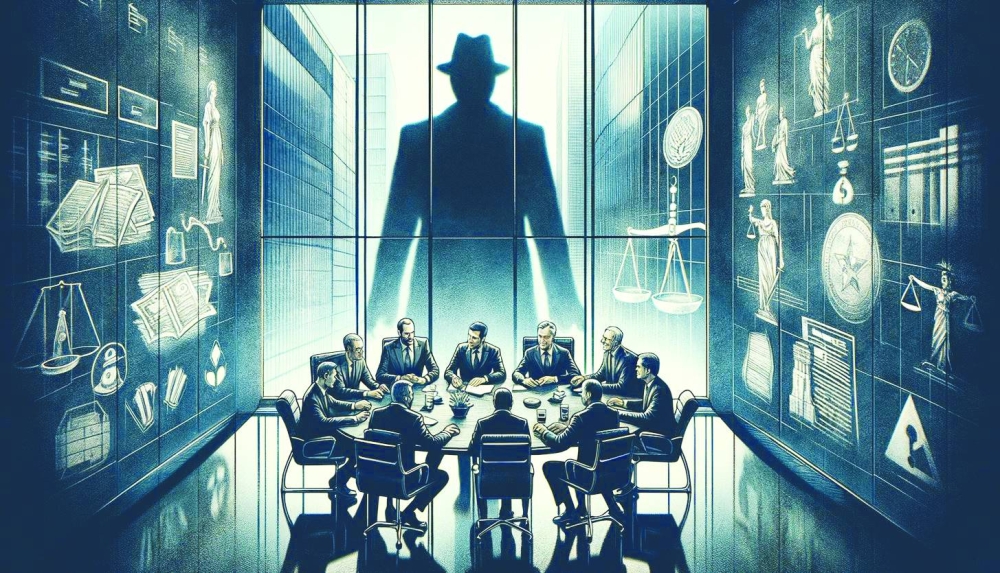Much has changed since January 2021, when Trump’s followers stormed the Capitol to prevent the certification of the 2020 presidential election. In the weeks following the insurrection, many businesses solemnly vowed not to fund candidates who denied that Joe Biden had won fair and square. But these commitments turned out to be no more than hot air.
The business world has never shown a real penchant for democratic governance, of course. When it comes to its own operations, it prefers autocracy over self-governance. Chief executives demand the obeisance of managers and workers, and shareholders, who are supposed to be in charge, are easily appeased with financial rewards and rarely muster the kind of collective action that it would take to hold executives to account.
What makes these business leaders so powerful? The standard answer is that they control the company’s assets. This is what Karl Marx meant when he argued that control over the means of production allows capitalists to extract surplus value from labour. Since then, economic models have vindicated him, demonstrating that control over assets does indeed translate into control over labour.
But matters are a little more complicated. After all, Schwarzman and Dimon do not own their companies’ machines or the buildings that house the traders, investors, or bank personnel whom they employ. They may own shares in their business empires, or options to buy more shares in their firms, but these holdings typically amount to only a fraction of all shares outstanding. And while shareholders, collectively, are often portrayed as owners, equity does not give them control over the business’s operations or its assets. Rather, it confers a right to vote for directors, to trade one’s shares, and to receive dividends.
But while CEOs rule as if they were true masters, they do so through a power that is enshrined in the legal tools they use to build their empires. They can rely on corporate and labour laws that privilege shareholders over labour; financial regulations that protect the stability of financial markets; and the generosity of central banks and taxpayers, who not infrequently bail out their businesses when they have overplayed their hands.
These dependencies are rarely acknowledged, and the crucial role that democracy plays in establishing the legitimacy and authority of the law even less so. Business leaders are more comfortable cutting deals with themselves than they are with submitting to collective self-governance, but they are also deeply reliant on law and the political system that underpins it.
By self-dealing, they are replaying the early history of state building, which the late sociologist Charles Tilly analogised to “organised crime.” In early modern Europe, political leaders remain in power by regularly cutting deals with their friends, who then cut more deals with clients whom they needed on their side. The “rest” of society served as foot soldiers: a resource to be exploited by the powerful to fund internal and external peacekeeping.
But here is the rub. Unlike deals that are encoded in law, these kinds of arrangements are not enforceable. Nothing prevents a future president from breaching the promises he makes to business leaders on the campaign trail, and Trump has made it abundantly clear that he has little patience for the law and the constraints it imposes on him as a business leader, a president, or a private citizen. That makes him a highly unreliable business partner, and an outright dangerous candidate for the presidency.
Yet many business leaders are turning a blind eye to all this. They are betting on more empowerment, lower taxes, and fewer legal and regulatory constraints. Some will try to cut deals to prevent Trump from taking revenge on them for past disloyalty or slights. But what they will all be getting, ultimately, is legal uncertainty – which is bad for business.
Call it the Hong Kong syndrome. When advocates of democracy and the rule of law took to the streets in Hong Kong to resist central control by the mainland Chinese government, most business leaders (and the bosses of big law and accounting firms) stood by silently, and then embraced the security law that ended Hong Kong’s relative autonomy. Presumably, they feared the people more than the Chinese state, and thus welcomed the restoration of order after the demonstrations were crushed.
But this strategy has backfired. State control has tightened not only on advocates of democracy, but on business as well. Businesses have resorted to self-help by moving data centres to other jurisdictions, giving their employees in Hong Kong single-use cell phones, and otherwise reducing their presence in a city that once shined as a global marketplace and financial hub.
They did not understand that individual self-defence is more costly and less effective than collective self-defence. The latter requires a vibrant constitutional democracy in which the rule of law reflects a genuine commitment to robust self-governance, rather than serving as a fig leaf for rule by Big Business. By the time Schwarzman, Dimon, and other US business titans discover the costs of writing off democracy by embracing Trump, it will be too late. — Project Syndicate
- Katharina Pistor, Professor of Comparative Law at Columbia Law School, is the author of The Code of Capital: How the Law Creates Wealth and Inequality.

